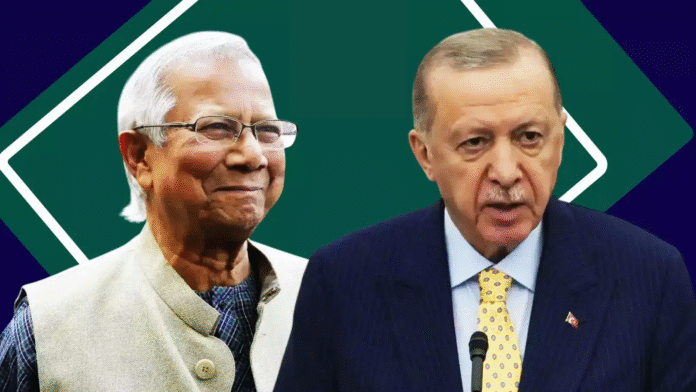In a significant move that may redefine South Asia’s defense diplomacy, Bangladesh is in early talks with Turkey to sign a strategic defense and intelligence-sharing agreement, according to reliable diplomatic sources in Dhaka and Ankara.
While no official confirmation has yet been released, sources inside the Ministry of Foreign Affairs and the Armed Forces Division suggest that the deal could cover critical areas such as UAV technology transfers, joint naval training, and counter-terror intelligence sharing.
This signals a calculated pivot by Dhaka away from its traditional dependence on Indian defense assistance and Chinese military hardware. Officials familiar with the matter describe it as a “multi-theatre diversification of defense policy.”
“This is a balancing act. Bangladesh wants strategic autonomy while staying engaged with both regional and global powers,” says Dr. Reza Mahmud, defense analyst at the South Asia Strategic Forum.
Turkish Drones for Bay of Bengal
The Turkish defense manufacturer Baykar, maker of the renowned Bayraktar TB2 drones, is believed to be among the firms approached for a potential co-production agreement in Bangladesh. The move echoes Turkey’s recent outreach to other Muslim-majority countries in Africa and Central Asia, positioning itself as an alternative military partner to the West or China.
“Bangladesh is particularly interested in developing indigenous surveillance capability for its maritime borders,” said a senior navy official on condition of anonymity.
India Watches, China Waits
India has not yet responded officially. However, foreign policy insiders indicate growing unease in New Delhi, particularly as the region’s Bay of Bengal dynamics are further complicated by Chinese-funded port projects in Chittagong and Payra.
“Bangladesh is asserting itself geopolitically — and both India and China will have to recalibrate,” commented Lt Gen (Retd) Ramesh Bhatia, former Indian Defense Attaché to Bangladesh.
China, which has been the primary supplier of Bangladesh’s naval vessels and air defense systems in recent years, is reportedly watching the developments quietly. Some sources suggest that Beijing may attempt to counterbalance Turkish advances with fresh offers of naval hardware and soft loans.
Erdoğan’s Expanding Sphere
Turkey’s President Recep Tayyip Erdoğan has actively promoted a multipolar defense alliance across the Islamic world — from Pakistan to Somalia. Bangladesh’s defense overtures now place it within Ankara’s strategic orbit.
A Bangladeshi official involved in backchannel discussions told Netra Report:
“We’re not replacing anyone. We’re diversifying. Turkey offers us defense technology without strings, unlike the geopolitical calculations of India or China.”
What Happens Next?
A formal Joint Working Group session between Bangladesh and Turkey is expected in July 2025, with sources hinting at a possible official MoU signing during Erdoğan’s South Asia visit later this year.
If realized, this would be a landmark in Bangladesh’s post-1971 defense history — the first such pact with a NATO country beyond its immediate neighborhood.


